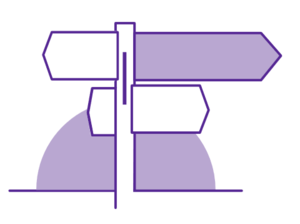
Project Mid-way Evaluation
This method is useful for evaluating a project currently in progress, to see if any adjustments need to be made for the team to work more effectively together. It provides a framework for discussion. Participants focus on the things that are helping and hindering the team process, and create action steps for improvement.
Goal
For evaluating a project currently in progress
Materials
Instructions
Step 1:
Gather the team around a flipchart or whiteboard. Give each person pens and post-its.
Facilitator notes
If you have a group larger than 10, you can split them into smaller sub-groups, run the exercise, and discuss the exercise as a whole at the end.
Step 2:
Draw one of the following images on the flipchart/board. They all work well, but will yield slightly different results:
- A boat with a sail and an anchor. The Sail represents things that are driving the project forward, and the Anchor things that are holding it back.
- A wheel with five sections named: stop, start, continue, do more, do less.
- Three columns named: mad (with an angry face); sad (sad face); glad (happy face).
Step 3:
Ask team members to add post-its to the flipchart with words for each category, individually and in silence. Give them as much or as little time as you have, but 5-10 minutes should be enough.
Step 4:
They should now cluster the notes in each category. Identifying duplicates, patterns, and overlaps.
Step 5:
Once the notes are organized, the team can discuss what has emerged. Is anything surprising? What are the commonalities? What have we seen before? How do we feel about this? Discuss for about 15-20 minutes . Try to keep the discussion focused. Ensure that team members don’t slip into generalizations or blaming each other. The goal is to have an effective, efficient discussion about the process so far.
Step 6:
Once the discussion has reached an end the team should define some actions. Ensure that they are written down, shared between the team and relevant stakeholders, and given a deadline for completion.
Background
Inspired by: Chris Argyris: theories of action, double-loop learning and organizational learning, Mark K. Smith
Source: Hyper Island toolbox
Hyper Island designs learning experiences that challenge companies and individuals to grow and stay competitive in an increasingly digitized world. With clients such as Google, adidas and IKEA, Hyper Island has been listed by CNN as one of the most innovative schools in the world



Comments (0)